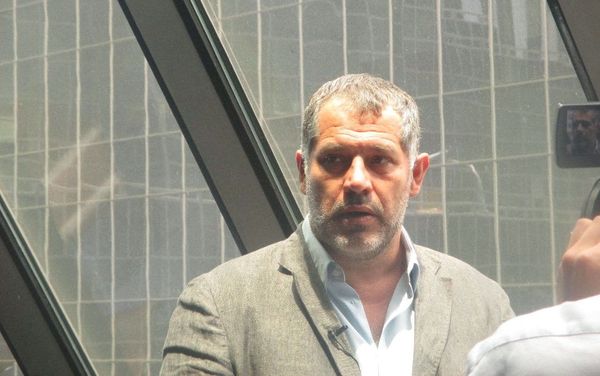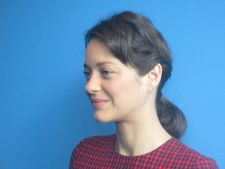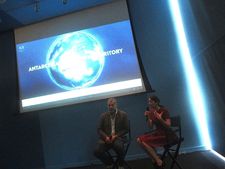 |
| March Of The Penguins director Luc Jacquet on his Wild-Touch Ice & Sky project Photo: Anne-Katrin Titze |
The closing night film of this year's Cannes Film Festival was Luc Jacquet's documentary Ice And The Sky (La Glace Et Le Ciel), featuring the work of glaciologist Claude Lorius on the impact of climate change discovered in Antarctica. Oscar winner for March Of The Penguins, Jacquet, together with Marion Cotillard, who won the Oscar for her portrayal of Édith Piaf in Olivier Dahan's La Vie En Rose (La Môme) and was nominated as Best Supporting Actress for Luc Dardenne and Jean-Pierre Dardenne's Two Days, One Night (Deux Jours, Une Nuit), came to New York for the Wild-Touch official launch of Ice & Sky.
Following their presentation in Le Skyroom on the 8th floor of the French Institute Alliance Française about the new program created with an educational digital cross-disciplinary approach to bring awareness of climate issues, Luc Jacquet and I had a conversation on his long-standing commitment for change.
 |
| Marion Cotillard at the Ice & Sky official launch in New York Photo: Anne-Katrin Titze |
One of the goals of Wild-Touch is to use "the dramatic strength of images, movies and art to arouse interest and help people discover, understand and take action."
Anne-Katrin Titze: Your new Wild-Touch project also has a focus on children. Do you remember when you first became aware of Global Warming and its related issues?
Luc Jacquet: First of all, I am a biologist. My background is biology. Early on, I became aware of a lot of conservation issues in the world from my studies 30 years ago. I was in Antarctica where Claude Lorius, the Glaciology scientist, brought the very first results. I think it was around 1985, 1986. So it's a long time ago.
AKT: For you the science came first and then you became a filmmaker?
LJ: I became a filmmaker really by chance because I was in Antarctica and I started to take some pictures. When I came home, I met a director [Hans-Ulrich Schlumpf, director of Der Kongress Der Pinguine] who said - oh, you have to do something with your pictures. It was absolutely by luck.
AKT: The Ice & Sky project includes an educational program that brings children to Antarctica to film there. Are you planting the seeds for a new crop of documentary filmmakers who are aware of the environment?
LJ: Transmission is something that is absolutely important to me. I think, I was very lucky in my life. And now I have to give this to the children. To give them the opportunities to film for themselves what is around them, inspired by nature. For me, this is where the platform starts. If you are inspired and moved by what is around you, humans, nature - I think your outlook will be better.
 |
| Ice & Sky with Luc Jacquet and Marion Cotillard: "For me, cinema, either documentary or fiction, is inspired by the society." Photo: Anne-Katrin Titze |
AKT: You brought up Biodiversity as the focus of your future projects. Will that include feature movies?
LJ: Yes, we are always working in the same way at Wild-Touch, because you have to choose different media to go for different audiences. I think you need all these media together to raise awareness because it's also a way to explain the same with different ways. For example, you cannot explain a lot in a film, I mean a theatre released film. You can bring emotion, you are able to tell a story but you cannot go into detail. So it's important to have different levels of knowledge in different media.
AKT: At the same time, documentary movies are having a moment in the sun right now and people seem to be more aware of them. Films can be highly important as a starting point, no?
JL: For me, cinema, either documentary or fiction, is inspired by the society. It is a reflection of society. And now, that if there are so many documentaries, it means that there are a lot of things to do in a society and that there are a lot of bad things in the society. So it's a way to raise awareness, to say something. But art, in general, is the same thing. Art is the exploration what the artists are feeling. I think it's the same for documentaries.
AKT: One of your Wild-Touch slogans is "poetry merges with science."
JL: Yes, because we are allowed to do both of them. There is no science at the bottom and then poetry on top. We can use science like raw material to tell stories. And great stories, like we are able to with social matters or other things. It works.
Coming up, Marion Cotillard and Luc Jacquet's presentation of the official launch of Ice & Sky at the French Institute Alliance Française in New York and a conversation with Connect4Climate's Francis James Dobbs, Max Edkins, Connect4Climate's Creative Director, and writer Carol Kaufmann on Film4Climate. A Cannes Film Festival Film4Climate panel discussion on reducing the environmental impact of film production was held with film industry executives and representatives to "reach a consensus on industry standards to reduce film production impact on the environment and raise climate change awareness through film."





















